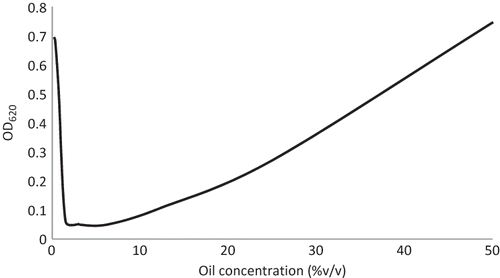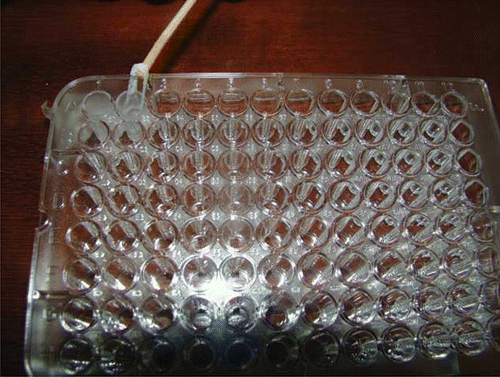SUMMARY
It was observed during a microdilution assay that oil destroyed the structural integrity of polystyrene wells. This is a significant observation, as using plastic materials with frankincense oil could compromise absorbance measures, influence microbial viability, and potentially increase migration from plastics into foods containing oil.
OBSERVATION
Frankincense is used in the food industry in beverages, candies, chewing gums, gelatins, and puddings. The original aim of this study was to determine minimum inhibitory concentrations (MICs) of frankincense oil against a panel of microorganisms associated with food. The oil interacted with the microtiter wells and this report focuses on that observation.
Dilutions (50; 25; 12.5; 6.3; 1.6; 0.8; 0.4; and 0.2% v/v) of steam distilled frankincense oil were prepared in 96-u-shaped-well plastic microtiter plates (Ser-wel, polystyrene, UK) using nutrient broth (for bacteria) and yeast malt broth (for moulds). Subsequently suspensions of specific microorganisms were added. Controls included broth diluent, microbial suspension, and all dilutions of oil. The microtiter plates were incubated aerobically at 37oC for 24 h (bacteria) or 25oC for 48 h (moulds), subsequently, well absorbances were read at 620 nm. The absorbance trend showed a slow then more rapid decrease in culture OD620 with increasing concentration of oil up to 6.3% when further increases resulted in an increase in OD620 (). At 50, 25, and 12.5% (v/v), the oil destroyed the structural integrity of the wells. The wells appeared cloudy and the plastic was soft and sticky ().
Figure 1 Effect of frankincense oil on the optical density of Fusarium solani cultures in microtitre plates, one of the most sensitive species.

Figure 2 Microtiter plate wells in contact with 50% v/v frankincense oil, illustrating the resultant fluid, sticky, and opaque nature of the polystyrene. (Color figure available online.)

Interactions between essential oils and plastic materials are known, but food scientists may be unaware. Polystyrene microtiter plates were used to test the anti-biofilm activity of frankincense steam-distilled oil at concentrations up to 25% (v/v) and no well damage was reported.[Citation1] When testing antifungal activity neat oil from flower heads of Chrysanthemum coronarium, was placed on plastic petri dish lids.[Citation2] In addition, in this study frankincense oil affected polystyrene based items including sterile pipettes while polypropylene materials (syringe, stomacher bag, and pipette tip) were not obviously affected. Terpinene, d-limonene, phallandrene, and p-cymene, which are constituents of many essential oils, have been shown to be good solvents for polystyrene foams.[Citation3] High oil concentrations should be handled with care; plastic items are frequently used in laboratories and have a major role in packaging.
ACKNOWLEDGMENT
The authors would like to acknowledge funding from Sultan Qaboos University, Oman through internal grant IG/AGR/FOOD/11/04.
REFERENCES
- Schillaci , D. , Arizza , V. , Dayton , T. , Camarda , L. and Di Stefano , V. 2008 . In vitro anti-biofilm activity of Boswellia spp . oleogum resin essential oils. Letters in Applied Microbiology , 47 ( 5 ) : 433 – 438 .
- Alvarez-Castellanos , P.P. , Bishop , C.D. and Pascual-Villalobos , M.J. 2001 . Antifungal activity of the essential oil of flowerheads of garland chrysanthemum (Chrysanthemum coronarium) against agricultural pathogens . Phytochemistry , 57 ( 1 ) : 99 – 102 .
- García , M.T. , Gracia , I. , Duque , G. , de Lucas , A. and Rodríguez , J.F. 2009 . Study of the solubility and stability of polystyrene wastes in a dissolution recycling process . Waste Management , 29 ( 6 ) : 1814 – 1818 .
